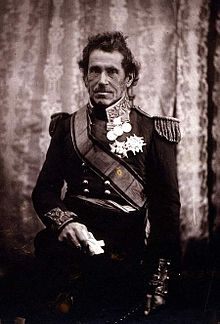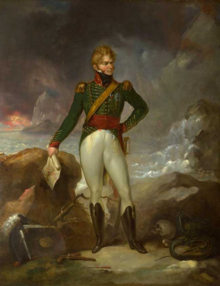George de Lacy Evans
Sir George de Lacy Evans | |
|---|---|
 Evans photographed in 1855 | |
| Born | 7 October 1787[1][2] Moig, County Limerick, Ireland |
| Died | 9 January 1870 |
| Allegiance | United Kingdom |
| Service | British Army |
| Rank | General |
| Commands | British Legion 2nd Division |
| Battles / wars | |
| Awards | Knight Grand Cross of the Order of the Bath Grand Cross of the Legion of Honour (France) |
| Other work | Member of Parliament |
General Sir George de Lacy Evans GCB (7 October 1787 – 9 January 1870) was an Irish officer in the British Army who served in four of the United Kingdom's 19th century wars. He became a long-serving Member of Parliament.[3]
Life
[edit]Evans was born in 1787, in Moig, County Limerick, Ireland. Educated at Woolwich Academy he followed his elder brother Richard (1782–1847) into the military, joining the East India Company's forces in 1800 before volunteering for the British Army in India in 1806. He obtained an ensigncy in the 22nd Regiment of Foot in 1807 then exchanged into the 3rd Light Dragoons in order to take part in the Peninsular War.[4] He was sent on the expedition to the United States of 1814 during the War of 1812 under Major General Robert Ross. Evans was quartermaster general to Ross at the Battle of Bladensburg on 24 August 1814, and during the Burning of Washington, as well as at the Battle of North Point on 12 September 1814, where Ross was killed.

Evans was actively involved in the New Orleans campaign at the conclusion of the War of 1812. He was the only British Army officer present at the Royal Navy 'small boat action' on Lake Borgne, and was wounded at the battle of New Orleans.
Returning to the European war with the restoration of Emperor Napoleon I, Evans was present at the battle of Quatre Bras on 16 June 1815 and the battle of Waterloo on 18 June 1815, and went on half pay in 1818.
Although he had no personal experience in Central Asia, Evans became increasingly concerned that Russia had designs on India posing a threat of an attack through Central Asia. He wrote two books, “On the Designs of Russia” (1828)[5] and “On the Practicability of an Invasion of British India” (1829).[6] highlighting this threat. These books were influential in persuading Edward Law, 1st Earl of Ellenborough, President of the Board of Control of India, to gather intelligence from all sources, including sending out young officers to explore the possible invasions routes into India, as part of the Great Game.[7]
Evans commanded the British Legion, which volunteered to assist Isabella II of Spain in the First Carlist War (1833-1840). In 1846, he was promoted to Major-General, and on the outbreak of the Crimean War in 1854, he was promoted to Lieutenant-General.
In 1853 he was given the colonelcy for life of the 21st Regiment of Foot (Royal North British Fusiliers) and promoted full general on 10 March 1861.[8]
He served as a Member of Parliament (MP) for Rye in 1830, and from 1831 to 1832, and for Westminster from 1833 to 1841 and from 1846 to 1865. He was also awarded the Grand Cross of the French Legion of Honour.[9]
In 1854, Evans was appointed to command the 2nd Division at the start of the Crimean War, and fought at the Battle of the Alma. Around the time of the Battle of Inkerman, he was sick, so Major General John Pennefather was in command of the division. He was later invalided home. On his return home, he received the thanks of the House of Commons.
Beginning in the middle 1850s Evans became a strong advocate for reform of the British army. In particular he was harshly critical of the system by which British army officers purchased their commissions and were expected to pay for each rank of promotion. While he did not live to see the final abolition of the purchase system which occurred in 1871, his persistent call for amelioration was instrumental in its ultimate demise.[10]
Evans died on 9 January 1870, and is buried in Kensal Green Cemetery, London.
Portraits of Evans were painted by Peter Edward Stroehling (above) and Richard Buckner.[11] The original life-size Buckner portrait was rediscovered in 2012 and was authenticated by art historian Philip Mould on the BBC Antiques Road Show at Cheltenham in 2013.
Sir George de Lacy Evans's medals and awards are on display at the Queens Own Royal Hussars Museum located in the Lord Leycester Hospital in Warwick.

Arms
[edit]
|
References
[edit]- ^ Tucker, Spencer C. (2012). The Encyclopedia Of the War of 1812: A Political, Social, and Military History [3 volumes]: A Political, Social, and Military History. ABC-CLIO. p. 235. ISBN 9781851099573. Retrieved 21 June 2019.
- ^ Spiers, Edward M. (1983). Radical General: Sir George de Lacy Evans, 1787-1870. Manchester University Press. p. 1. ISBN 9780719009297. Retrieved 21 June 2019.
1787.
- ^ Chisholm, Hugh, ed. (1911). . Encyclopædia Britannica (11th ed.). Cambridge University Press.
- ^ "EVANS, George De Lacy". Institute of Historical Research. Retrieved 25 May 2016.
- ^ Lieut-Colonel De Lacy Evans, On the Designs of Russia (John Murray, London, 1828) - available on Google Books.
- ^ Lieut-Colonel De Lacy Evans, On the Practicability of an Invasion of British India, and on the Commercial and Financial Prospects and Resources of The Empire (London, Printed for JM Richardson, Cornhill (1829) - available on Google Books.
- ^ Peter Hopkirk, The Great Game, On Secret Service in High Asia, (John Murray, Paperback Edition 2006, Reissued 2016) pp. 116-118.
- ^ "No. 22497". The London Gazette. 29 March 1861. p. 1375.
- ^ A dictionary of general biography: with a classified and chronological index of the principal names, William Leist Readwin Cates, page 44
- ^ Slater, Carl (December 1979). "The Problem of Purchase Abolition in the British Army 1856-1862".
- ^ "Portrait of Sir George de Lacy Evans – print after Buckner". British Library. Retrieved 30 May 2015.
- ^ "Grants and Confirmations of Arms Vol. F". National Library of Ireland. p. 72. Retrieved 28 June 2022.
Sources
[edit]- Adkin, Mark (2001). The Waterloo Companion. Aurum. ISBN 1-85410-764-X
- Barbero, Alessandro (2005). The Battle: A New History of Waterloo. Atlantic Books. ISBN 1-84354-310-9
- George, Christopher T., Terror on the Chesapeake: The War of 1812 on the Bay, Shippensburg, Pa., White Mane, 2001, ISBN 1-57249-276-7
- Spiers, Edward M. (1983). Radical General: Sir George de Lacy Evans, 1787–1870, U.K., Manchester University Press, ISBN 0-7190-0929-4
- Leigh Rayment's Historical List of MPs
- This article incorporates text from a publication now in the public domain: Wood, James, ed. (1907). The Nuttall Encyclopædia. London and New York: Frederick Warne.
{{cite encyclopedia}}: Missing or empty|title=(help) - de Lacy Evans' grave at historyhome.co.uk
Further reading
[edit]- Brett, Edward M. The British Auxiliary Legion in the First Carlist War 1835–1838: A Forgotten Army. Dublin: Four Courts Press, 2005.
- Bullen, Roger and Strong, Felicity (Eds.). Prime Minister Papers Series I. Palmerston: Private Correspondence with Sir George Villiers (afterwards 4th Earl of Clarendon) as Minister to Spain 1833–1837. London: Royal Commission of Historical Manuscripts, HMSO, 1985.
- Coverdale, John F. The Basque Phase of Spain's First Carlist War. Princeton: Princeton University Press, 1984.
- De Porras y Rodríguez de León, Gonzalo. La Expedición de Rodil y las Legiones Extranjeras en la Primera Guerra Carlista. Madrid: Ministerio de Defensa, 2004.
- Duncan, Francis. The English in Spain: The Story of the War of Succession between 1834 and 1840. London: John Murray, 1877.
- Evans, Sir George De Lacy. Memoranda of the Contest in Spain. London: James Ridgway, 1840.
- Holt, Edgar. The Carlist Wars in Spain. Chester Springs (Pennsylvania): Dufour Editions, 1967.
- Pirala, Antonio. Historia de la Guerra Civil. Madrid: Turner SA / Historia 16, 1984. (6 Volumes).
- Rodriguez, Moises Enrique. Under the Flags of Freedom: British Mercenaries in the War of the Two Brothers, the First Carlist War and the Greek War of Independence (1821–1840). Lanham (Maryland): Hamilton Books, 2009.
- Shaw, Charles. Personal Memoirs & Correspondence of Col. Charles Shaw, comprising a Narrative of the War for Constitutional Liberty in Portugal and Spain. London: Henry Colburn Publishers, 1837. (2 Volumes).
- Shelley, Ronald G. The British Legion in Spain during the First Carlist War. Brighton: Spanish Philatelic Society, 1975.
- Somerville, Alexander. History of the British Legion and the War in Spain 1835–1837. London: James Pattie, 1839.
- Spiers, Edward M. Radical General: Sir George de Lacy Evans 1787–1870. Manchester: Manchester University Press, 1983.
External links
[edit]- 1787 births
- 1870 deaths
- Military personnel from County Limerick
- Liberal Party (UK) MPs for English constituencies
- British Army generals
- British Army personnel of the Napoleonic Wars
- British Army personnel of the War of 1812
- British Army personnel of the Crimean War
- UK MPs 1831–1832
- UK MPs 1832–1835
- UK MPs 1835–1837
- UK MPs 1837–1841
- UK MPs 1841–1847
- UK MPs 1847–1852
- UK MPs 1852–1857
- UK MPs 1857–1859
- UK MPs 1859–1865
- Burials at Kensal Green Cemetery
- Knights Grand Cross of the Order of the Bath
- Graduates of the Royal Military Academy, Woolwich
- 3rd The King's Own Hussars officers
- West India Regiment officers
- Cheshire Regiment officers
- British Auxiliary Legion personnel
- Grand Cross of the Legion of Honour
